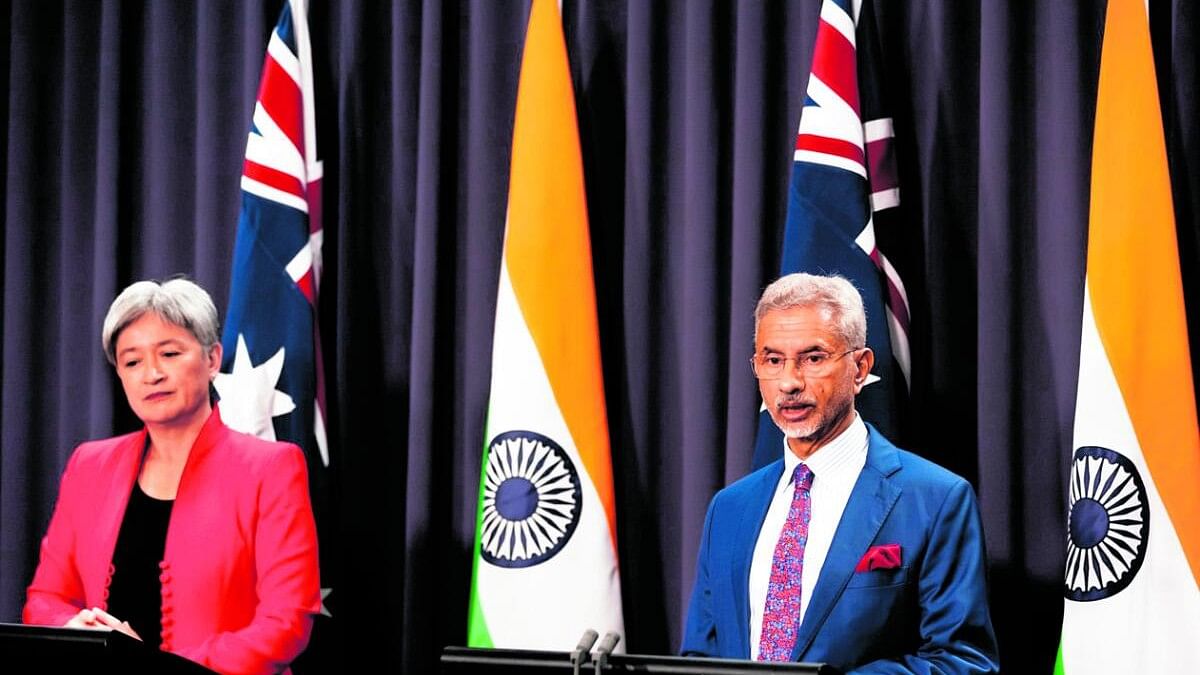
External Affairs Minister S Jaishankar with Australian Foreign Minister Penny Wong during the 15th India - Australia Foreign Ministers’ Framework Dialogue, in Canberra, Australia.
Credit: PTI Photo
External Affairs Minister S Jaishankar’s interaction with the Indian community in Brisbane on November 4 turned out to be a moveable feast for gourmet connoisseurs in the world of diplomacy.
Jaishankar reflected on our deeply troubled world tottering on the abyss of a potential human catastrophe through the looking glass of an Indian mediation in the Ukraine war and the Israel-Iran standoff. More importantly, he proposed a new habitation and name for the Quadrilateral Security Dialogue (Quad) at the daybreak in the Himalayas, where nonetheless, a ‘Morning without you is a dwindled dawn’ — to borrow the beautiful line from Emily Dickinson.
This is the first time, perhaps, that Jaishankar publicly spoke about India’s peacemaking in the Ukraine war and the cascading West Asian crisis. Jaishankar proclaimed Delhi’s “proactive diplomacy” in Eurasia and “pre-emptive diplomacy” in West Asia by trying to get Iran and Israel “to talk to each other directly.” After all, not many countries can match in India in its sheer audacity and legitimacy to represent the Global South.
Indeed, Jaishankar would have been self-conscious that he was speaking from Australian soil, a key member of the Five Eyes which has gone out of the way to express its solidarity with Canada in the widening cracks in Canberra-New Delhi equations. Jaishankar was actually en route to Canberra.
Titanic forces are locked in contestation in both Eurasia and West Asia, and peacemaking must wait. There is no question that the West is still seeking Russia’s capitulation. Curiously, just last weekend, Brisbane also had another distinguished visitor, Prof Niall Ferguson, the arch neo-imperialist historian whose best-selling book Empire: How Britain Made the Modern World is a major reinterpretation of the British Empire. The book messages, incidentally, that all of India’s miseries notwithstanding, the gang of buccaneers and gold-diggers from Great Britain planted the seed of the biggest empire in all history — and did eventually set the colony on the road to modernity.
Ferguson addressed on November 1 the prestigious 2024 CIS Consilium at the influential Centre for Independent Studies (CIS) on the Gold Coast. His address was almost entirely a rebuttal of profound American strategic thinker and eminent academic at Chicago University John Mearsheimer — best known as the doyen of the ‘realist’ school of diplomacy. Mearsheimer in last year’s lecture at the CIS argued that foolish US policies, such as NATO expansion, pushed Russia closer to China, whereas, in a multipolar world, the US should have recognised its limits to power and reordered strategic priorities away from Ukraine and Israel to focus more on Asia and deal with a far more important China threat.
Ferguson’s counter-thesis was: the US failed to deter an expansionist Russia, and faces with its allies such as Australia an axis of China, Russia, and Iran. He argued that if Washington wants to contain China effectively, the US needs to keep in check Russia and Iran. Ferguson urged that if you want peace, you must prepare for war first.
To be sure, Jaishankar would have heard about the dust raised by Ferguson in the Australian strategic circles. Interestingly, during the Q&A at the Brisbane event, Jaishankar also touched on China, saying that “the disengagement [in Ladakh] is a welcome step. It opens up the possibility that other steps could happen.” Jaishankar asked: “What does it mean for the Quad?” He answered the question himself that as a grouping of “four democracies, four market economies, four countries with a strong record of global contributions,” who also “happen to be maritime nations who have found a kind of a common agenda on which to work,” Quad has a “bigger purpose.” But, he cautioned that “This is not a security agenda.”
Indeed, then, what is Quad’s agenda, especially as India too is besieged? Jaishankar stated calmly, “I mean the Quad does many things. I mean from connectivity and climate forecasting to fellowships to health. So there are a whole sort of set of activities out here.”
He went on to explain that given the diminishing global influence of the US, Quad can make up for the ensuing deficit as a grouping of “four countries who feel on many basic issues that they have a common viewpoint working together.”
The felicity with which Jaishankar spoke hinted that his mind is already applying India's doctrine of 'multi-alignment' (which carries his imprimatur, by the way) to Quad against the dramatic backdrop of the changing political climate across the Himalayas and at a juncture when New Delhi is feeling besieged.
(M K Bhadrakumar is a former diplomat.)
Disclaimer: The views expressed above are the author's own. They do not necessarily reflect the views of DH.